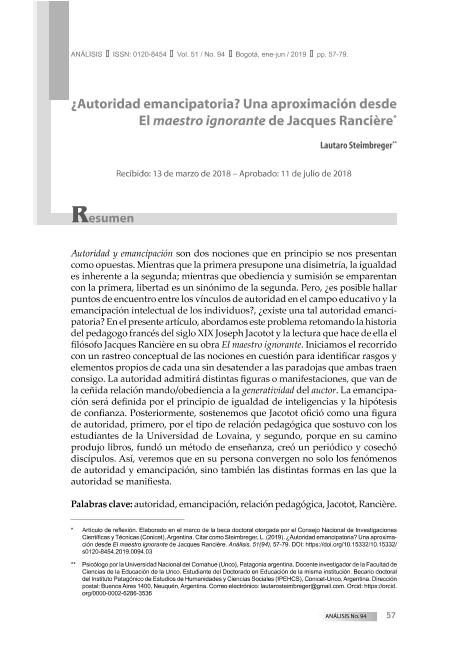Artículo
Autoridad y emancipación son dos nociones que, en principio, se nos presentan como opuestas. Mientras que la primera presupone una disimetría, la igualdad es inherente a la segunda; mientras que obediencia y sumisión se emparentan con la primera, libertad es un sinónimo de la segunda. Pero, ¿es posible hallar puntos de encuentro entre los vínculos de autoridad en el campo educativo y la emancipación intelectual de los individuos?, o ¿existe una tal autoridad emancipatoria? En el presente artículo, abordamos este problema retomando la historia del pedagogo francés del siglo XIX, Joseph Jacotot, y la lectura que hace de ella el filósofo Jacques Rancière en su obra El maestro ignorante. Iniciamos el recorrido con un rastreo conceptual de las nociones en cuestión para identificar rasgos y elementos propios de cada una, sin desatender a las paradojas que ambas traen consigo. La autoridad admitirá distintas figuras o manifestaciones, que van de la ceñida relación mando/obediencia, a la generatividad del auctor. La emancipación será definida por el principio de igualdad de inteligencias y la hipótesis de confianza. Posteriormente, sostenemos que Jacotot ofició como una figura de autoridad, primero, por el tipo de relación pedagógica que sostuvo con los estudiantes de la Universidad de Lovaina, y segundo, porque en su camino produjo libros, fundó un método de enseñanza, creó un periódico y cosechó discípulos. Así, veremos que en su persona convergen no sólo los fenómenos de autoridad y emancipación, sino también las distintas formas en que la autoridad se manifiesta. Authority and emancipation are two notions that, at first sight, appear to us as opposites. While the first presupposes a dissymmetry, equality is inherent to the second; while obedience and submission are related to the first, freedom is a synonym of the second. But is it possible to find points of contact between the links of authority in the field of education and the intellectual emancipation of individuals? Or is there such an emancipatory authority? In this article, we face this problem by recapturing the history of a nineteenth-century French pedagogue, Joseph Jacotot, and the reading that the philosopher Jacques Rancière makes of it in his work The ignorant schoolmaster. We begin the journey with a conceptual tracing of the notions in question in order to identify features and elements of each one, without neglecting the paradoxes that both bring with them. The authority will admit different figures or manifestations that go from the tight relation command/obedience, to the generativity of the auctor. Emancipation will be defined by the principle of equality of intelligences and the hypothesis of trust. Subsequently, we maintain that Jacotot officiated as a figure of authority, first, by the type of pedagogical relationship he held with the students of the University of Louvain, and second, because in his path he produced books, founded a teaching method, created a newspaper and reaped disciples. Thus, in him converge not only the phenomena of authority and emancipation, but also the different ways in which authority manifests itself.
¿Autoridad emancipatoria? Una aproximación desde El maestro ignorante de Jacques Rancière
Título:
Emancipatory authority? An approach from The ignorant schoolmaster of Jacques Rancière
Fecha de publicación:
01/2019
Editorial:
Universidad Santo Tomás
Revista:
Análisis
ISSN:
0120-8454
e-ISSN:
2145-9169
Idioma:
Español
Tipo de recurso:
Artículo publicado
Clasificación temática:
Resumen
Palabras clave:
AUTORIDAD
,
EMANCIPACIÓN
,
RELACIÓN PEDAGÓGICA
,
JACOTOT
,
RANCIÈRE
Archivos asociados
Licencia
Identificadores
Colecciones
Articulos(IPEHCS)
Articulos de INSTITUTO PATAGONICO DE ESTUDIOS DE HUMANIDADES Y CIENCIAS SOCIALES
Articulos de INSTITUTO PATAGONICO DE ESTUDIOS DE HUMANIDADES Y CIENCIAS SOCIALES
Citación
Steimbreger, Lautaro; ¿Autoridad emancipatoria? Una aproximación desde El maestro ignorante de Jacques Rancière; Universidad Santo Tomás; Análisis; 51; 94; 1-2019; 57-79
Compartir
Altmétricas




